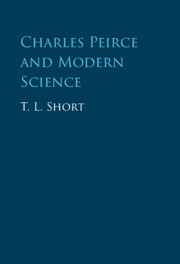Book contents
- Charles Peirce and Modern Science
- Charles Peirce and Modern Science
- Copyright page
- Dedication
- Contents
- Preface
- Acknowledgments
- A Note on Citation of Sources
- Chapter 1 Peirce’s Life in Science: 1859–1891
- Chapter 2 Peirce’s Concept of Science
- Chapter 3 Modern Science Contra Classical Philosophy
- Chapter 4 The Meaning of Pragmatism
- Chapter 5 Misleading Appearances of System
- Chapter 6 Devolution of the Cosmogonic Program
- Chapter 7 Experiments Expanding Empiricism
- Chapter 8 Phaneroscopy and Realism
- Chapter 9 Normative Science
- Chapter 10 Modern Science Contra Modernity
- Bibliography
- Index
Chapter 6 - Devolution of the Cosmogonic Program
Published online by Cambridge University Press: 26 October 2022
- Charles Peirce and Modern Science
- Charles Peirce and Modern Science
- Copyright page
- Dedication
- Contents
- Preface
- Acknowledgments
- A Note on Citation of Sources
- Chapter 1 Peirce’s Life in Science: 1859–1891
- Chapter 2 Peirce’s Concept of Science
- Chapter 3 Modern Science Contra Classical Philosophy
- Chapter 4 The Meaning of Pragmatism
- Chapter 5 Misleading Appearances of System
- Chapter 6 Devolution of the Cosmogonic Program
- Chapter 7 Experiments Expanding Empiricism
- Chapter 8 Phaneroscopy and Realism
- Chapter 9 Normative Science
- Chapter 10 Modern Science Contra Modernity
- Bibliography
- Index
Summary
Peirce’s 1890s cosmological speculations were fascinating failures. Their basic idea, that laws require explanation, which could only be by evolution from lawless chaos, was suggested by the success of statistical reasoning in thermodynamics and in Darwinian biology. But the development of that idea was supposed to predict the forms of physical laws not yet discovered, and none of its mutually incompatible developments could do that. In one version, Peirce projected a form of idealism, anti-conceptual and named ’objective’, in which feelings unfelt by any organism are supposed to constitute the material universe; this idealism disappears from later writings. In another version, he projected a ’law of mind’, fundamental to other laws, confused by some commentators with his c.1902 idea of final causation. But such a law and final causation are polar contraries; in showing this, I develop and defend Peirce’s idea of final causation, made use of in Chapter 9.
Keywords
Information
- Type
- Chapter
- Information
- Charles Peirce and Modern Science , pp. 125 - 156Publisher: Cambridge University PressPrint publication year: 2022
